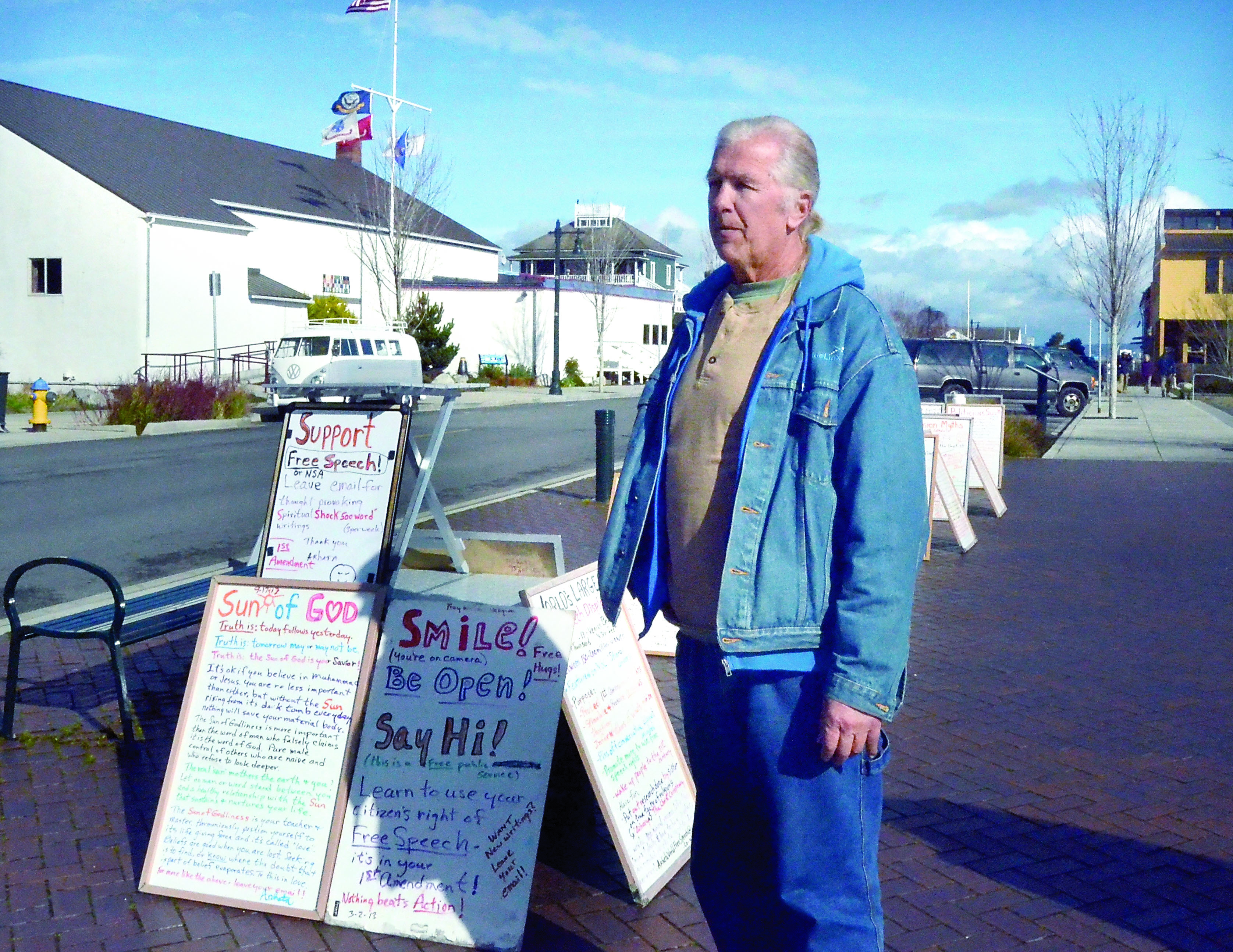PORT TOWNSEND — The day after the City Council discussed establishing guidelines for free-speech displays, the man who prompted the discussion said he will not willingly abide by the ruling.
“If they pass this, they are going to have to cart me away,” said Arhata Osho, 64, on Wednesday.
“This is all about free speech, which is the basis of what it means to live in this country,” he said.
Osho regularly displays about 20 handwritten whiteboards containing a variety of controversial statements, along with U.S. flags, at Pope Marine Park.
Complaints about Osho’s display prompted council members to consider regulating them.
The council unanimously approved the first reading of the new ordinance Tuesday night. The measure won’t become law until the council votes on a second reading.
Council members said the intention was not to stifle free speech but to confine large displays into proscribed areas so as not to interfere with other activities.
A proposed ordinance broached last year has been revised.
The guidelines include limiting free-speech displays that use tables to a space 5 feet wide, 3 feet deep and 3 feet high.
Displays must be kept out of sidewalk rights of way, away from sidewalks and crosswalks or public benches.
Those sponsoring the displays cannot leave them unattended for more than five minutes at a time, and each protester will be allowed only one sign.
The ordinance won’t affect musicians or those gathering signatures for petitions as long as they don’t have tables.
Yet to be addressed is placing buffer zones around public art, such as the “Salish Sea Circle.”
This is meant to preserve the character of the downtown and not force people to take pains to go around the display, the city said.
“One person’s exercising their freedom of speech should not prevent others from exercising theirs,” said Councilwoman Deborah Stinson.
Osho disagreed, saying that true free speech is by its nature interfering.
City Attorney John Watts said that while Osho’s presence prompted the creation of the ordinance, it was not specifically directed against him.
If he is allowed as much room as he wants, it will set a precedent for others to do the same, Watts said.
“Of course they are going to say that,” Osho responded.
Councilwoman Michelle Sandoval, who in the past said she didn’t want any ordinance to be too restrictive, now feels that more deliberate rules are needed.
“At first, I wanted this to be as loose as possible but have decided that coming up with some clear, specific guidelines is the way to go,” she said.
Osho said in July that he intended to follow the letter of any law that is passed but has apparently changed his mind, saying that if an ordinance is passed, he will actively resist.
He said he moved to Port Townsend in 2007 because of its open-mindedness and, for what he wanted to do, good weather and large numbers of people who pass through.
“This is one of the most open-minded towns in the world, which is why I chose to move here,” he said, adding that he was born in Port Townsend and that the late H.J. Carroll, a Port Townsend businessman who donated the land and money for the 40-acre park that bears his name in Chimacum, was his uncle.
He said that Port Townsend has a long history of supporting free speech, as it is located in what he calls “Thomas Jefferson County.”
Police Chief Conner Daily said he favored specific guidelines because each contact with Osho becomes a “negotiation” about what he will or will not do at that particular moment.
Osho did not attend the Tuesday meeting.
The sole public comment at the meeting came from Rosalind Russell, 88, who said she had a long commitment to free speech but felt the ordinance was “too modest” and didn’t go far enough.
“I’ve been around long enough to know what was done to suppress free speech,” she said.
“I was around during the McCarthy era, and I support free speech as much as anyone in this room and don’t want to see it curtailed,” she said.
“You have done so much to create this beautiful historic area that can be enjoyed by anyone, and you have pages of regulations that businesses must follow, so I don’t see why tables and an unknown amount of signs should be allowed in this area.
“I think you should reconsider this, and it should be much stronger.”
________
Jefferson County Editor Charlie Bermant can be reached at 360-385-2335 or cbermant@peninsuladailynews.com.
